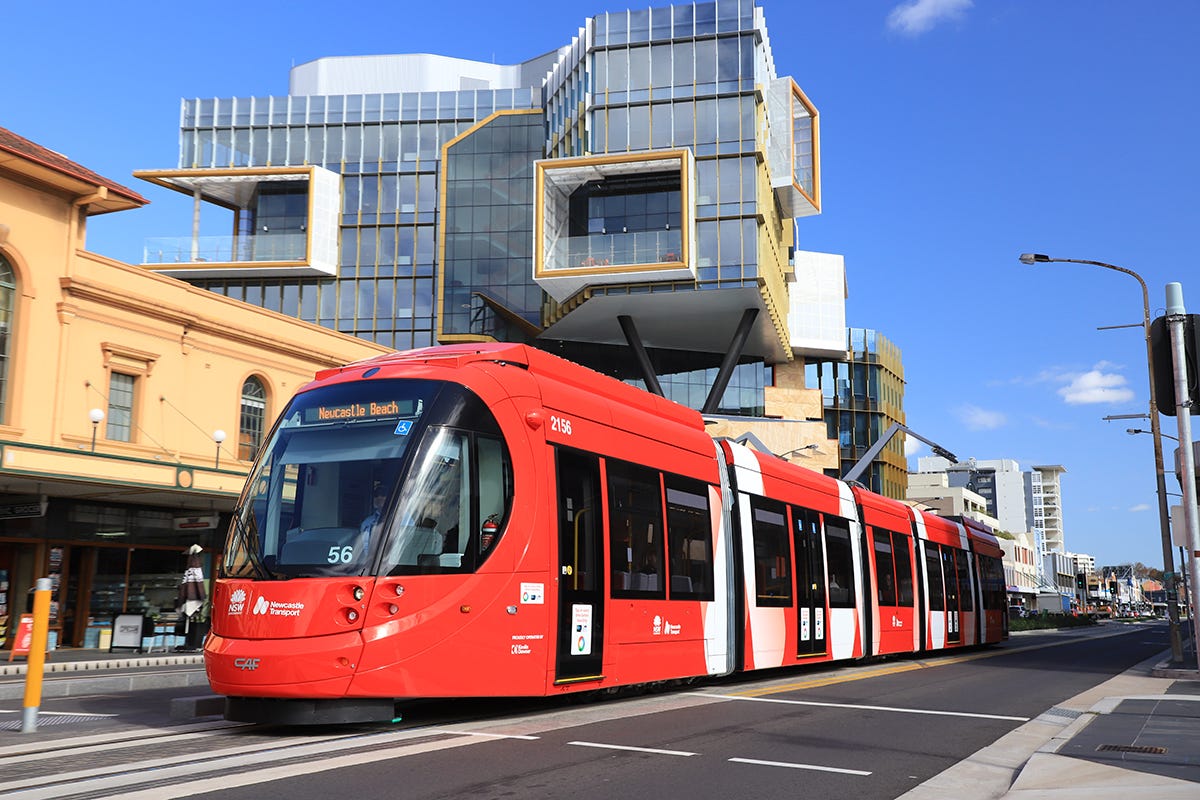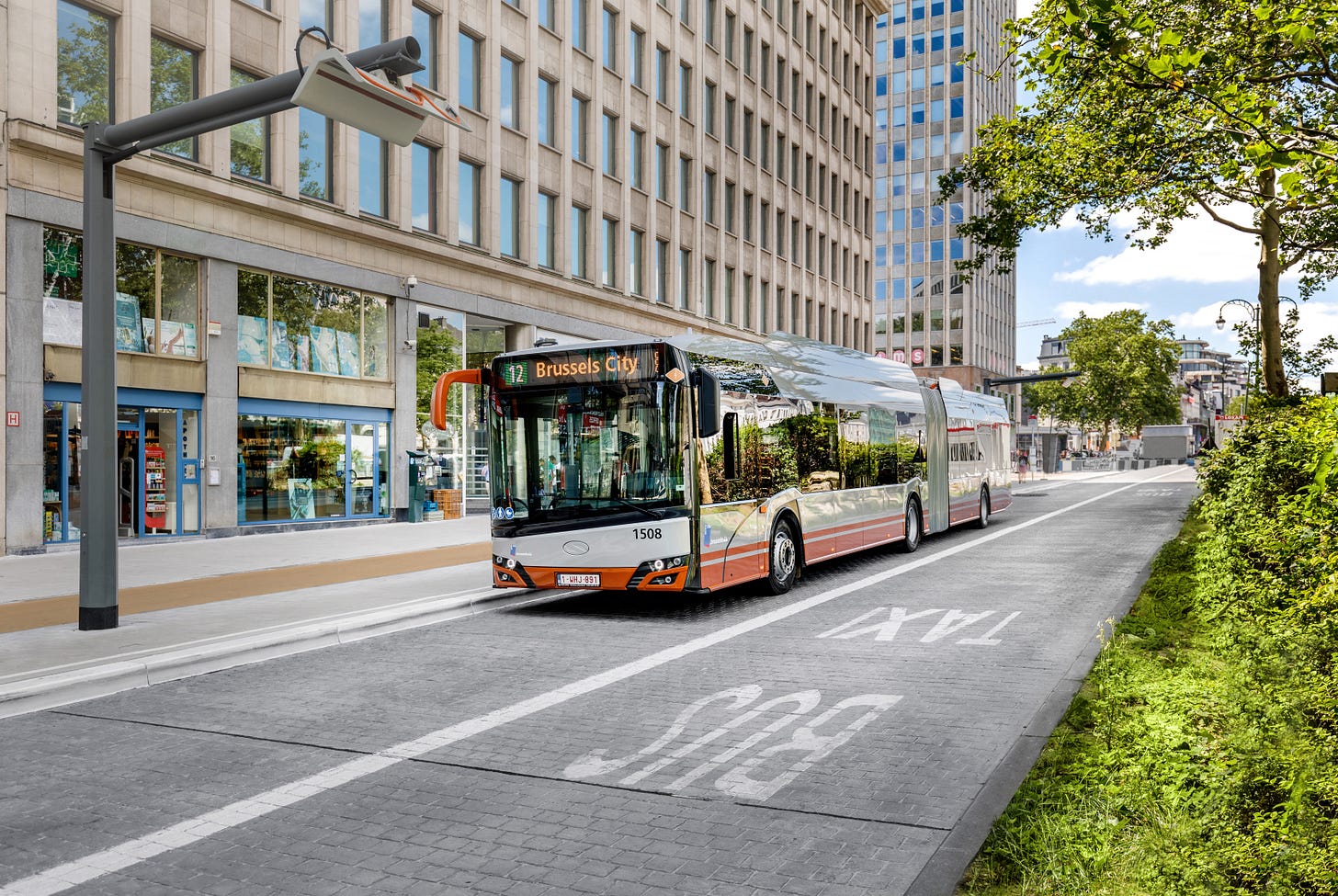Construcciones y Auxiliar de Ferrocarriles S.A.
A company to benefit from the New Green Urban Mobility
Summary
Spanish company which provides mass green urban mobility solutions and services.
High sector growth assured thanks to new carbon emission rules and directives to be implemented this decade.
Unique offering (Rail+Bus) vs Competitors.
Undervaluation vs Peers (2023e EV/EBITDA 5.14 vs 9)
Experienced management team with a proven track record.
Introduction
If you have walked around any European capital you have surely noticed: urban mobility has completely changed in the last decade. New bike lanes are being built, electric scooters are popping up everywhere, public transport is being updated quickly and a city is no longer cool without a public bycicle-sharing system. Meanwhile cars are outright banned from the city center or at least have to pay a congestion charge to freely move.
The future politicians are imposing us for our urban transportation points clearly in two directions: banning polluting private means of transport and developing green mass transport.
It’s time to benefit from this dogmatic viewpoint.
Construcciones y Auxiliar de Ferrocarriles S.A (BME: CAF) is a Spanish company which develops both Rail and Bus green solutions for a complete de-carbonization of public transport. Its unique product offering positions the company in a great spot to capture the government spending that will be made in public transport in the next decades.
Even better, CAF stock is now trading at a huge discount compared to its peers, despite its greater offering in the area of mobility (Rail+Bus) and despite having greatly improved its fundamentals in the last years. This undervaluation of the company, due to some short-term issues (inflation and supply chain constraints), shouldn’t last for long so now it’s the time to capitalize on it.
A deeper look into CAF.
Headquartered in the Spanish Basque Country, Construcciones y Auxiliar de Ferrocarriles S.A. was founded at the beginning of the 20th century, focusing on the manufacture of freight wagons. Through the years it has developed one of the most comprehensive and flexible arrays of products in railway related markets, such as rolling stock, components, infrastructure, signalling and services (maintenance, refurbishing and financial services).
With the acquisition of Solaris in 2018, the company entered into the electric bus market dividing the company in two different segments, Rail and Bus.
Rail
CAF has one of the widest rolling stock offerings in the market, encompassing Metro trains, Tram Rail, High Speed trains, Regional trains, etc. It has a strong presence in Europe but also in countries like USA, India or Australia, so the chances are quite high that you have enjoyed a trip on one of its trains.
Rail is the main activitiy of CAF, its revenues totalling €2,222M, 75% of the group total.
CAF has focused lately on growing in Integrated Solutions and Systems, going from 5% of its rail backlog in 2016 to 15% of the backlog in 2021. These kind of projects allow CAF to capture revenue throughout the entire life of the project life cycle, from the design and construction of the project to its operation and maintenance. This way CAF gets both the CAPEX (vehicles, refurbishment, electrification, signalling, etc) while the project is built and also the OPEX (operation and maintenance) once the project is finished, securing an income stream for much longer.
These large-scale projects come with an improvement in contract conditions compared to standalone projects due to its high entry barriers and the more limited competition.
Bus
In 2018 CAF decided to diversify away from rail with the takeover of Solaris for €300M, a polish bus company leader in the zero-emission bus market, transforming CAF from a rail solutions company to an integrated mobiliby solutions provider. Solaris covers the complete range in green buses: Hybrid, trolleybus, battery and hydrogen.
The integration of Solaris in the CAF group has gone smoothly, with a CAGR in double digits since its acquisition (57% revenue increase in less than 4 years). In 2021, Solaris revenue reached €791M, adding up to almost 25% of the group revenues.
Thanks to carbon emission rules to achieve climate neutrality the future looks brighter than ever for Solaris. For example, the EU Clean Vehicle Directive sets minimum targets for new zero-emission urban buses of 45% by 2025 and 65% by 2030. These kind of programs present in most western countries are a huge tailwind for Solaris and the CAF group, ensuring its growth potential for this decade.
CAF Strategic Plan 2016-2021
In 2016, CAF launched its strategic plan focused on the transformation of the company from a pure rail company to a provider of integrated mobility solutions. The plan was a big success, more than doubling its revenue and EPS in 5 years. More importantly, the improvement in growth and profitability was achieved with no increase in leverage, reducing the Net Financial Debt/EBITDA ratio almost in half.
In spite of fundamentals vastly improving, the share price went nowhere, trading in a range between 20€-45€, testing the upper limit several times but unable to break it.
Supply chain constraints and inflation have greatly darken CAF’s prospects since the beginning of 2021, taking the stock back towards the bottom of the range, at around €25. A higher energy bill (>300% increase) and increased salary and material costs have significantly decreased its EBIT margin, going from 8.5% in 2016 to 5.6% in 2021 and 4.3% in H1 2022.
Around 1/3 of CAF’s current backlog is not covered against rising prices, prompting management to put in place a mitigation plan to minimise the impact of inflation and supply chain disruptions.
Both divisions are taking a hit but in diferent ways: the bus division is suffering a faster impact with progressive improvement in sight once bus deliveries progress and the projects underway are renewed, looking for the start of the normalisation of profitability in 2023. On the other hand, the impact on the rail division is less severe but more prolongued, expecting the start of the normalisation of profitability in 2024.
Good news is that CAF has no exposure to Russia or Ukraine, unlike the majority of its competitors.
CAF 2026 Strategic Plan
At the beginning of last month, CAF presented its new Strategic Plan 2026. Having the advantage of a strong base from the previous strategic plan, this plan is centered around operating efficiencity, innovation, commercial focus and sustainability. Management expects to achieve a double digit CAGR both in Revenue and EBIT in the next 5 years. If the plan is successful, revenue will more than triple and EBIT will almost triple since 2016.
The increase in revenue would occur in both divisions, taking Rail revenues to €3500M and Bus revenues to €1300M. This numbers also include potential €550M in M&A transactions that would provide €400M in 2026 Revenue, which would elevate NFD/EBITDA up to 2.2x. As they have already proven with Solaris, these adquisitions could prove to be highly profitable in a few years.
Margins are also expected to improve once the impact of inflation and supply chain disruptions are over, allowing the company to achieve its €300M EBIT target. An EBIT margin around 6%-7% would put CAF in line with its competitors, like Alstom SA (EPA:ALO) or Stadler Rail AG (SWX:SRAIL).
The dividend, having almost doubled in the period 2016-2021 from €0.58 to €1, is expected to rise in line with the results. Assuming also a CAGR of 10% on the dividend, 2026 expected dividend would be on the €1.50-€1.70 range
In short, it looks like an ambitious but at the same time achievable plan; a natural evolution of the CAF businesses building on its strenghts, rather than a revolution. After a few years focused on the transformation and new positioning of the company, now its time to reap the rewards.
Valuation
Entering 2023 CAF valuation is around €925M (€27.10/share closing on January 3rd) with an Enterprise Value of €1.32B. This valuation gives as a result a 2023e EV/EBITDA ratio of 5.14 (vs 9 competitors), a 2023e P/E ratio of 11.95 (vs 15 competitors) and a 2023e P/FCF ratio of 10 (vs 15 competitors).
Solaris alone deserves a higher valuation but I prefer to be conservative and value the totallity of the company at the same multiple. For comparison purposes Ebusco (AMS: EBUS), a zero-emission bus company that IPO’ed in 2021, has an EV of 750M€ with only a fraction of the revenues of Solaris.
The following valuations represent where the company should be trading today, not further into the future. As the company keeps growing at double digit rates the valuation of the company should also increase.
EV/EBITDA Valuation
Comparing to its historical 7x EV/EBITDA would get us a valuation close to
Total Enterprise Value = FY 2023e EBITDA €265.77M x 7= €1860.39M
Market Capitalization = €1860.39M (TEV) - €400M (Debt) = €1,460.39M
Price Target = €1,460.39M (Market Cap) /34.23M (Shares outstanding) = €42.66/share (57.42% upside potential).
If we use a more aggresive multiple of 9x EV/EBITDA like the one its competitors enjoy, we would arrive to a €58.19/share price target (110% upside potential).
P/E Ratio Valuation
For a price-to-earnings valuation I rely on the analyst consensus for 2023, which expects GAAP earnings per share of 2.42€. Applying a 15x multiple as its competitors enjoy we arrive to a price target of €36.30/share (34.44% upside potential).
We can see in the analyst estimates that as the EBIT margin improves in the following years the result in EPS will be considerable.
P/FCF Valuation
For the Price-to-Free Cash Flow valuation I also rely on the analyst consensus estimate.
2023e FCF per share = €103.78M (FCF) / 34.23M (shares outstanding) = €3.03/share
Employing a 15x multiple in line with competitors, we would arrive at a €45.45/share valuation (67.71% upside potential).
Company Risks
1 - Persistent Inflation & Supply Chain Disruptions - Right now this is the major risk that CAF faces which could delay its profitability assumptions. Its stock price will also take a hit if the inflation and supply chain situation doesn’t improve soon.
2 - Overindebted Governments - Raising interest rates after a period of high public deficits during the pandemic could mean that the necessary investments in public transportation in many cities are delayed or scrapped.
3 - New Competitors in the Electric Bus Business - While Rail is a more mature sector with strong players and high barriers to entry, the electric bus business could see the entrance of new competitors attracted by the expected future growth and the strong investment by governments. I think its quite likely that new players enter the business but Solaris is well ahead of its competitors and enjoys a very solid leadership position.
Conclusion
Construcciones y Auxiliar de Ferrocarriles S.A. has a unique position in both Rail and Bus to benefit from the de-carbonization of cities. Keeping a steady growth at double digit rate, once its inflation and suply chain issues have passed its valuation should catch-up to the one its competitors enjoy.
Counting on a management team that has already delivered and the tailwind from new regulations, CAF could be a big winner for the next few years and see its valuation break its all time highs.
Additional Material
If you are interested in CAF and want to learn more about it, I highly recommend to have a look at its 2026 Strategic Plan Presentation.











Another issue is CRRC entering the European Market as seen in Austria with the Westbahn.